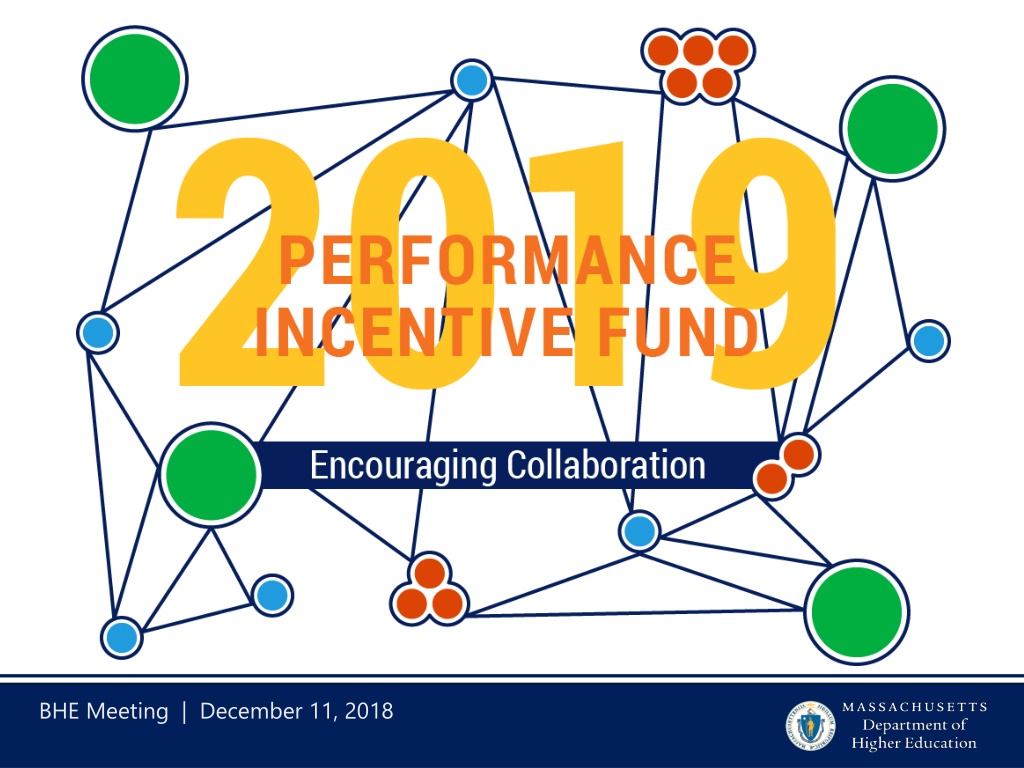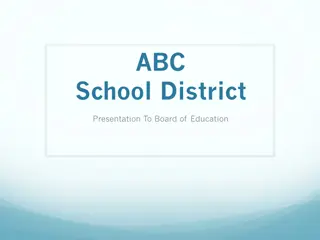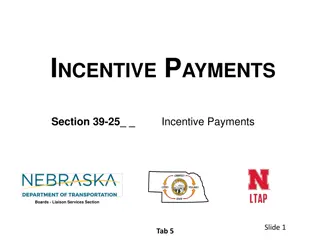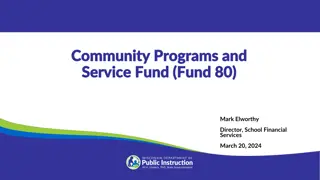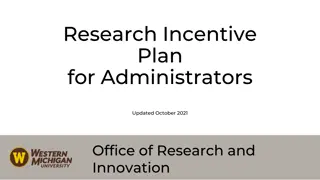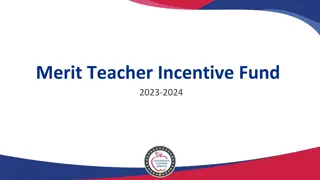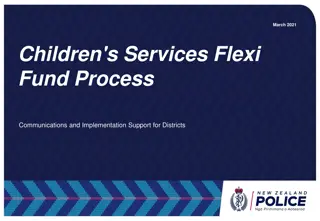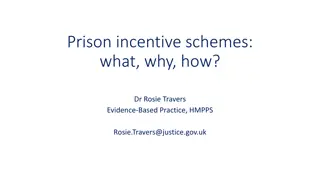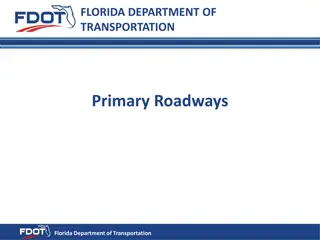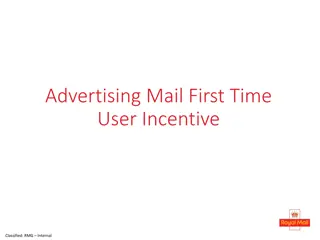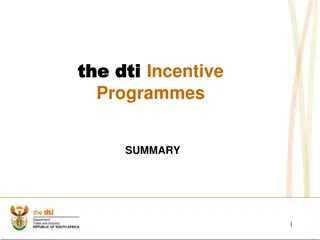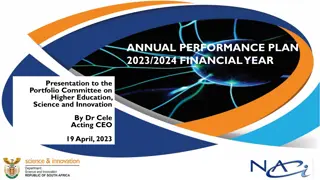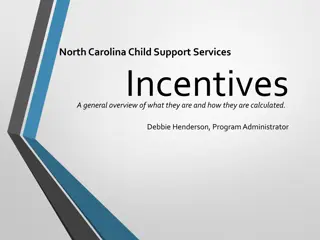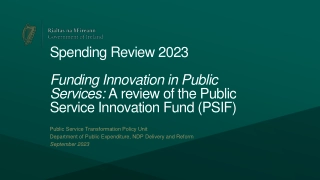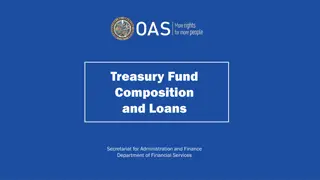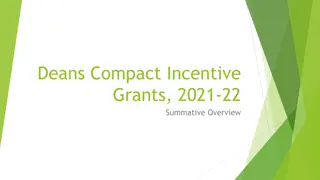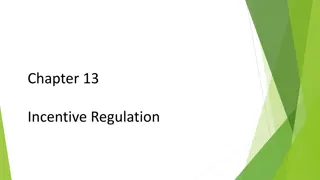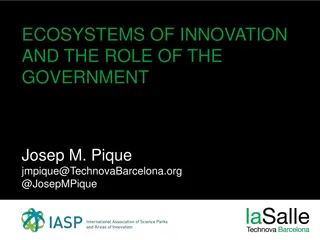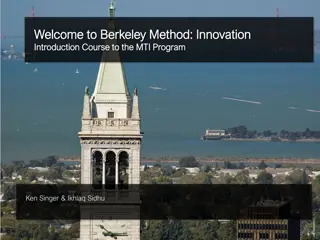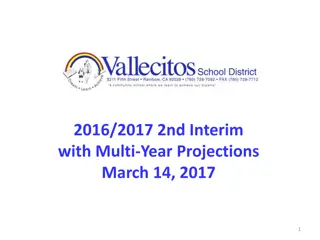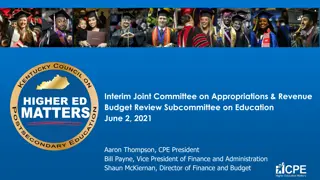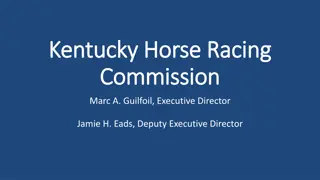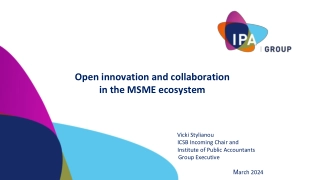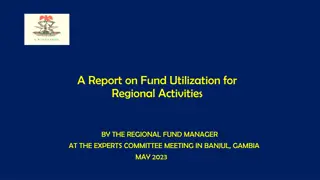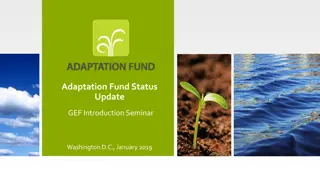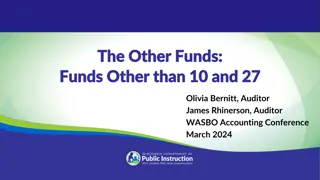Performance Incentive Fund Overview: Encouraging Collaboration & Innovation in Higher Education
Explore the Performance Incentive Fund (PIF) initiative aimed at promoting collaboration and innovation in higher education. Dive into the timeline, funding availability, redesign focus, grant categories, and strategic goals for enhancing student success and program sustainability. Discover how PIF supports curricular reform, capacity building, and systemic change while reducing duplication of efforts.
Uploaded on Oct 07, 2024 | 0 Views
Download Presentation

Please find below an Image/Link to download the presentation.
The content on the website is provided AS IS for your information and personal use only. It may not be sold, licensed, or shared on other websites without obtaining consent from the author. Download presentation by click this link. If you encounter any issues during the download, it is possible that the publisher has removed the file from their server.
E N D
Presentation Transcript
Performance Incentive Fund: Encouraging Collaboration Presentation Overview Timeline and History of the PIF Appropriation and Grant Activity FY19 RFP and Grant Awards Consortium projects for FY19 (OER, PLA, and CBE for ECE) system-level metrics for success 2
Performance Incentive Fund: Encouraging Collaboration Timeline FY 2017 2019 $7.85M in funding available through PIF Redesign focused on: 1. bringing best practices to scale 2. rigorous evaluation FY 2012 PIF created by MA Legislature to provide competitive grants to campuses to make progress on BHE goals FY 2012 2016 $22.5M in funding available through PIF FY 2016 UMDI PIF Evaluation 3
Performance Incentive Fund: Encouraging Collaboration FY2017 2019 Redesign RFP Categories for Campus & Consortium Grants: 100 Males to College Competency-based Pathways in ECE New Approaches to Affordability and Student Success Co-requisite and Multiple Math Pathways 4
Performance Incentive Fund: Encouraging Collaboration FY2017 2019 Redesign Limited project categories in order to: Provide better alignment with specific BHE Goals and ongoing projects Scale existing programs grounded in research and best practice Provide support for projects that could be rigorously evaluated at both campus and system levels by defining a common set of metrics for success Focus on sustainability through curricular reform, capacity building, and systemic change Promote collaboration and reduce duplication of efforts 5
Performance Incentive Fund: Encouraging Collaboration Trend in Appropriation & Grant Activity 6
Performance Incentive Fund: Encouraging Collaboration FY19 Campus & Consortium Grants 7
Why OER? OER offer tremendous cost savings to students, provide equitable access to course materials on day one, improve teaching and learning through the use of open pedagogy, and have a positive impact on student success. 8
Performance Incentive Fund: Encouraging Collaboration OER Timeline Fall 2018 Statewide OER Consortium Project funded by PIF Established OER Working Group Spring 2018 SAC Resolution in Support of OER Creation of MA CC 2016 MA Go Open Project https://www.oercommons.org/hubs/masscc OER Hub: https://www.oerco mmons.org/hubs/ masscc https://www.oercommons.org/hubs/masscc https://www.oercommons.org/hubs/masscc 2011 Open Education Initiative at UMass Amherst 9
Performance Incentive Fund: Encouraging Collaboration How will we measure success? Metrics: % increase in the use of OER over baseline established by Working Group in Fall 2018 Amount of money saved in textbook costs % of faculty using OER in their courses Success rates of students in courses using OER versus those using traditional textbooks 10
Massachusetts Open Education: Achieving Access for All Marilyn Billings, University of Massachusetts Amherst
Massachusetts Open Education: Achieving Access for All Goals of Grant Collaborative project focused on building awareness and capacity for open educational resources (OER) across the state Offers direct benefits to faculty and students at all 29 public higher education institutions in the Commonwealth Leaders from across the state: Community Colleges: Sue, Jody, Karen State Universities: Matt, Vicki, Shu University of Massachusetts: Marilyn, Jeremy 12
Massachusetts Open Education: Achieving Access for All Statewide Survey of Public Higher Education Assessing the OER Landscape Data analysis Workshop preparation 13
Massachusetts Open Education: Achieving Access for All OER Regional Trainings Events Understanding OER (introduction, open licensing, shared examples of OER, and discussion of OER adoption models) Teaching and Learning with Free and Open Educational Resources (ways to find and use free, CC licensed and public domain content, and incorporating open pedagogy) The Value of Open (benefits of OER and open pedagogy, examples of OER initiatives, research on OER, and data on the impact of OER) Implementing and Scaling OER Initiatives (collaboration, starting your initiative, policy, strategies, structure and process, and communicating about OER) Faculty receive $200 stipend for attending and reviewing an Open Education textbook in their field 14
Massachusetts Open Education: Achieving Access for All Regional Trainings Northern Essex Community College February 1, 2019 University of Massachusetts Amherst February 8, 2019 Bridgewater State University March 12, 2019 Worcester State University March 14, 2019 15
Massachusetts Open Education: Achieving Access for All Intensive Day of OER Development Launch Event: Faculty will work in teams to pool resources and experiences to curate, adapt and develop materials for MassTransfer courses May 23, 2019 @ NEOER Summit at UMass Amherst Limited to 70 faculty members statewide who will receive a $1,000 stipend for their work Mass Open Education project will seek applications from community college and state university instructors to work as part of a team to develop OER course materials for aMass Transfer Compact general education course More information will be available in January 16
Massachusetts Open Education: Achieving Access for All Massachusetts Open Education Team Matt Bejune, Worcester State Marilyn Billings, UMass Amherst, PI Jody Carson, Northern Essex CC Mary Dixey, Holyoke CC Vicky Gruzynski, Worcester State Karen Hines, Holyoke CC Shu Qian, Worcester State Jeremy Smith, UMass Amherst Susan Tashjian, Northern Essex CC Contact Information: ma-opened-l@library.umass.edu 17
Why PLA? Both Credit for Prior Learning (CPL) and Competency Based Education (CBE) programs appear to boost interest in pursuing coursework among adults who live in the Commonwealth. Maguire Associates 18
Performance Incentive Fund: Encouraging Collaboration PLA Timeline 2018 PIF Funded MACC PLA Consortium: All 15 CC s 2017 Maguire Associates: Massachusetts DHE: Adult Learner Quantitative Research Launch of My Experience Counts website 2016 Prior Learning Initiative: PLA policies inventory, professional development, and best practices 19
Performance Incentive Fund: Encouraging Collaboration How will we measure success? Metrics: # of credits awarded for PLA systemwide # of students who receive credit for PLA Amount of money saved based on # of credits awarded Retention and graduation rates of students receiving credit for PLA versus those who do not 20
PLA Consortium Dr. Karen Hynick, North Shore Community College
PLA Consortium Refueling the Race for Post- Secondary Success Study (CAEL) 22
PLA Consortium PLA Types of Competency-Based Education Industry Recognized Credentials Other Options Include Challenge Exams Advanced Placement CLEP DSST/Dantes BYU International Baccalaureate Excelisor Exams Thomas Edison Exams Microsoft Office Suite NIMS Certification Serv Safe Sanitation CDA Lean Certified Professional Licenses Portfolio Review Departmental Exams MOOCs ACE certifications Military training 23
PLA Consortium Data: PLA Impacts Student Success NSCC Data: Annually 430 students access PLA Average 8 credits Saves an average of $1,600 17% of our graduates last year had leveraged some form of PLA Roughly 260 courses mapped to a PLA option Ranked 1st in Massachusetts for serving the adult learner and 16th nationally CAEL: Refueling the Race to Post-Secondary Education Students that leverage PLA are 2.5X more likely to complete a college degree Positive benefits were across all student demographics Regardless of: Race Financial aid status Age Type of institution enrolled in 24
PLA Consortium Scaling PLA Initiatives from TAACCCT Grant PIF PLA Consortium Grant TAACCCT Grant Creation of Statewide PLA Website Self assessment tool E-portfolio linked to college CPL specialist Regional Professional Development of Faculty and Staff 250+ trained 5 regional trainings Ensuring campus updates to new statewide website Alignment to common cut scores for challenge exams for Mass Transfer Foundation Courses Alignment for industry recognized credentials to technical courses Common policies around CPL Common pricing of PLA for students Common coding and transcription of credit Statewide faculty repository of trained portfolio reviewers to compete with CAEL 25
PLA Consortium Further Developing MA CC Consortium Development Common coding Common marketing plan Partner with DHE for PLA alignment with MassTransfer (cut scores) 600,000 Massachusetts residents with some college but no degree to comeback and finish their degree through CPL and community college sector Application for ECCF Funds 75,000 over 2 years Consortium of the 15 Community Colleges most effective catalyst to accomplishing next steps to enhance each college enrollment and most cost efficient mechanism to achieve individual college ROI/surplus. HBS Study 2015 26
Why CBE for Early Childhood Educators? Competency-Based Education for Early Childhood Educators supports campus efforts to adapt academic programming to students mastery of key learning objectives for early childhood (birth age 8) educators 27
Performance Incentive Fund: Encouraging Collaboration Why CBE for Early Childhood Educators? Aligned with BHE Goals of Developing Better Integration with P 12, Incubating Innovation Continues collaborative work between DHE/EEC designed to address educational opportunity gaps where they are constructed in early childhood Creates a foundational CBE ECE certificate program and provides a pathway to Director 2 EEC Certification Maximizes resources and reduces duplication of efforts 28
Performance Incentive Fund: Encouraging Collaboration CBE for ECE Timeline 2018 2019 Focus on accreditation issues Closer collaboration with EEC and employers Targeted strategy to address wage issue 2017 2018 Professional development & resources offered to campuses faculty trainings, accessibility tutorial, accreditation webinar Deliverables completed faculty- written OER textbook, crosswalk standards and courses, employer needs assessment 2016 2017 Launch of PIF project to develop faculty capacity ECE Mass Transfer Pathways Explore Early EdU training to credit/ competency bearing 2010 2015 Cross Agency work to Advance certificate and degree attainment Report endorsed by DHE, EEC, ESE Commissioners 29
Performance Incentive Fund: Encouraging Collaboration Expansion of the Initiative Scaling Up: FY 2017 Participating Campuses 30
Performance Incentive Fund: Encouraging Collaboration Expansion of the Initiative Scaling Up: FY 2019 Participating Campuses 31
Performance Incentive Fund: Encouraging Collaboration How will we measure success? Metrics: Increase degree completion for adult learners through alt. delivery systems Broaden early educator access to certificates and degree programs Increase number of faculty who are able to describe national and local CBE models Expand model to engage all 15 community colleges 32
Competency-Based Pathways in Early Education and Care Consortium Kimberly Burns, Dean of Academic Innovations and Dean of Professional Development, Northern Essex Community College
Competency-Based Pathways in Early Education and Care Consortium Consortium Community Colleges Berkshire Bunker Hill Holyoke MassBay Middlesex North Shore Northern Essex Quinsigamond 34
Competency-Based Pathways in Early Education and Care Consortium Power of Partnerships DHE Community College Faculty EEC 35
Competency-Based Pathways in Early Education and Care Consortium FY18 Grant Outcomes Increased faculty knowledge of CBE New CBE credential New Child Growth and Development open textbook Review & pilot of EarlyEdu Alliance courses 36
Competency-Based Pathways in Early Education and Care Consortium FY18 Grant Outcomes Crosswalk of MassTransfer ECE Foundational Course Outcomes Environmental scan of employer needs & readiness for CBE Open access tools to assist campuses in rolling out CBE academic programs 37
Competency-Based Pathways in Early Education and Care Consortium FY19 Planned Activities EEC Career Pathways, Core Knowledge & Competencies review Competency alignment CBE pathway development Competency-based alternative credential OER and EarlyEdu Alliance Employer engagement 38
Competency-Based Pathways in Early Education and Care Consortium Early evidence ECE 101 Intro to Early Childhood Education 1st CBE ECE course Fall 2018 16 student educators Free; tuition funded by EEC R3P OER no textbook cost Improved mastery of content Increased success of linguistically diverse students 39
Competency-Based Pathways in Early Education and Care Consortium Vision Community colleges contribute viable solutions to the current early educator crisis AND builds sustainable on-ramp for future Early educators have greater access to higher learning through stacked, competency-based credentials New opportunities for linguistically and racially diverse practitioners Partnerships with employers 40
